#Rhythm and Time
Explore tagged Tumblr posts
Text
The Philosophy of Jazz
The philosophy of jazz is a rich and complex topic that encompasses the cultural, social, and musical dimensions of jazz as an art form. Jazz is not only a genre of music but also a way of thinking and being, reflecting values such as spontaneity, creativity, individuality, and community. The philosophy of jazz explores these themes, often connecting them to broader philosophical questions about identity, freedom, expression, and the nature of art.
Key Themes in the Philosophy of Jazz:
Improvisation:
Spontaneity and Creativity: Improvisation is central to jazz, emphasizing the importance of spontaneous creation and the ability to express oneself in the moment. This process challenges traditional notions of composition and performance, highlighting the dynamic interplay between structure and freedom.
Philosophical Reflection: Improvisation in jazz can be seen as a metaphor for life itself, where individuals must navigate unpredictability, make decisions on the fly, and adapt to changing circumstances. It reflects a philosophy that values flexibility, responsiveness, and the capacity to create meaning in real-time.
Freedom and Expression:
Artistic Freedom: Jazz has often been associated with the idea of freedom, both musically and socially. Musicians are encouraged to express their unique voices, experimenting with form, harmony, and rhythm. This freedom of expression is a core philosophical value of jazz.
Social and Political Dimensions: Jazz has historically been a voice for marginalized communities, particularly African Americans. It has been a medium for expressing resistance, resilience, and the struggle for civil rights. The philosophy of jazz, therefore, often intersects with discussions of freedom, equality, and social justice.
Individuality and Community:
Balancing the Individual and the Collective: Jazz is both a highly individualistic and a deeply communal art form. While it celebrates the unique contributions of individual musicians, it also depends on the interaction and collaboration within the ensemble. This balance reflects a philosophy that values both personal expression and collective harmony.
Dialogical Nature: The interplay between musicians in a jazz ensemble can be seen as a form of dialogue, where each musician responds to and builds upon the others' contributions. This dialogical aspect of jazz fosters a sense of community and mutual respect, where each voice is heard and valued.
Innovation and Tradition:
Respect for Tradition: Jazz has a deep respect for its roots and traditions, drawing on blues, gospel, and earlier jazz forms. Musicians often pay homage to past masters while exploring new directions, creating a dialogue between the old and the new.
Philosophy of Progress: At the same time, jazz is characterized by its constant innovation and evolution. The philosophy of jazz embraces change, experimentation, and the breaking of boundaries, reflecting a commitment to progress and the exploration of new possibilities.
The Blues Aesthetic:
Emotional Depth and Authenticity: The blues is foundational to jazz, bringing with it a philosophy that values emotional honesty, resilience, and the ability to find beauty in adversity. The blues aesthetic in jazz emphasizes the expression of deep, often painful emotions, and the transformation of those emotions into something meaningful and uplifting.
Existential Reflection: The blues, and by extension jazz, often grapples with existential themes such as suffering, loss, and the search for meaning. This reflects a philosophy that acknowledges the complexities of the human condition and the power of music to address and transcend those complexities.
Time and Rhythm:
Philosophy of Time: Jazz’s approach to time and rhythm, with its syncopation, swing, and complex rhythmic patterns, reflects a unique philosophy of time. Jazz often plays with the conventional understanding of time, stretching, compressing, and manipulating it in ways that challenge the listener's expectations.
Temporal Experience: This manipulation of time in jazz can be seen as a reflection on the fluidity of time itself, offering insights into how we experience and perceive time. It highlights the possibility of multiple temporalities coexisting, resonating with broader philosophical discussions about the nature of time.
Cultural Identity and Global Influence:
Jazz as a Cultural Expression: Jazz is deeply rooted in the African American experience, and its philosophy often engages with issues of cultural identity, heritage, and the diaspora. Jazz reflects the blending of African, European, and American musical traditions, creating a unique cultural expression that speaks to issues of identity and belonging.
Global Impact: Jazz has become a global phenomenon, influencing and being influenced by musical traditions around the world. The philosophy of jazz includes an appreciation of this cross-cultural exchange, recognizing the music's ability to transcend cultural boundaries and create a shared human experience.
Ethics and Aesthetics:
Moral Dimensions: The philosophy of jazz also includes ethical considerations, particularly regarding authenticity, integrity, and respect for the music and its practitioners. Issues such as cultural appropriation, commercialization, and the role of the artist in society are relevant to philosophical discussions about jazz.
Aesthetic Values: Jazz challenges traditional aesthetic values by embracing dissonance, irregularity, and complexity. It often defies conventional notions of beauty, proposing instead an aesthetic that values the raw, the real, and the unexpected.
Jazz and Existentialism:
Existential Themes: Jazz, particularly in its emphasis on freedom, individuality, and the search for meaning, shares affinities with existentialist philosophy. Both jazz and existentialism explore the human condition, the experience of alienation, and the quest for authenticity in an uncertain world.
Living Authentically: Just as existentialism advocates for living authentically in the face of an absurd or indifferent universe, jazz musicians often strive to find and express their authentic selves through their music, creating meaning through their art.
Jazz as a Way of Life:
Philosophy in Practice: For many musicians and fans, jazz is more than just a genre of music—it is a way of life, embodying a particular attitude toward life that values creativity, spontaneity, and the pursuit of excellence. This philosophy encourages living in the moment, embracing uncertainty, and finding joy in the process of creation.
The philosophy of jazz is multifaceted, touching on themes of freedom, individuality, community, creativity, and cultural identity. It reflects a way of thinking and being that is deeply intertwined with the music itself, offering insights into both the human experience and the nature of artistic expression. Jazz philosophy encourages an open, responsive, and innovative approach to life, celebrating the beauty of improvisation, the richness of diversity, and the power of music to connect, challenge, and inspire.
#philosophy#epistemology#knowledge#learning#education#chatgpt#ontology#Jazz#Improvisation#Artistic Freedom#Individuality#Community in Jazz#Jazz and Identity#Blues Aesthetic#Cultural Expression#Innovation in Jazz#Tradition in Jazz#Rhythm and Time#Jazz and Existentialism#Ethics of Jazz#Aesthetics of Jazz#Jazz Philosophy#Jazz as Dialogue#Cultural Identity#Global Influence of Jazz#Jazz and Social Justice#Authenticity in Jazz#Jazz as a Way of Life
3 notes
·
View notes
Text
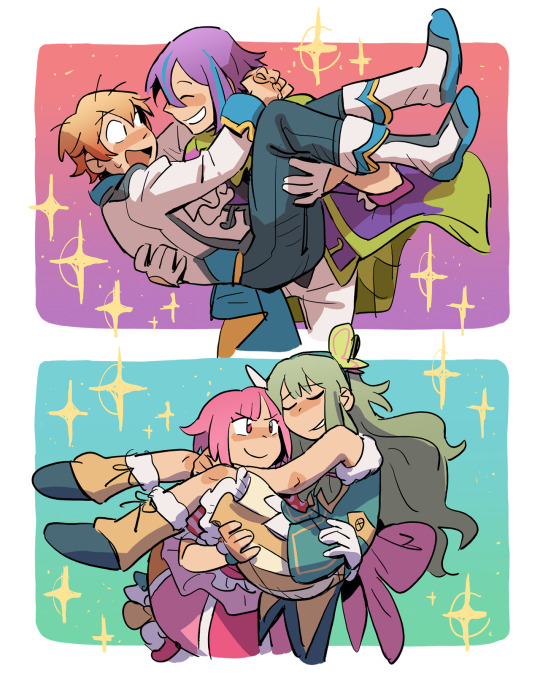
finally playing project sekai 4 years late (i like the clown unit)
#project sekai#tsukasa tenma#rui kamishiro#emu otori#nene kusanagi#tsukasa activates my cute aggression. every time he says anything or makes a funny noise i want to squeeze him like a squeaky toy#i thought i escaped idol hell but i relapse every time i touch a rhythm game
3K notes
·
View notes
Text


two guys enter a closet
#homestuck#hom3stuck#home24uck#home2t4ck#john egbert#dave strider#johndave#davejohn#pepsicola#admin draws#fanart#somethign really fun about . john being the tune and dave being the beat. free melody plus rhythm. breath and time.#that was my thought behind the 1st one at least#this post? texan in oregon. next post? oregonian in texas.#sighs. ive been influenced. theyve been on my mind#see this is what happens when i listen to people who passionately argue a case for a ship i jump on board#its not like i wasnt a johndave girlie before but the emptiness of my tag prior to this phase of homestucking speaks volumes#now tho? theyre good. theyre real good. and my palate cleanser between fkn. alpha morons that shall not be named#i like them ogk. egbertcrockers with many moles and striders with pizza faces. is something i should draw more#i need to get better at drawing acne and acne scarring
2K notes
·
View notes
Text
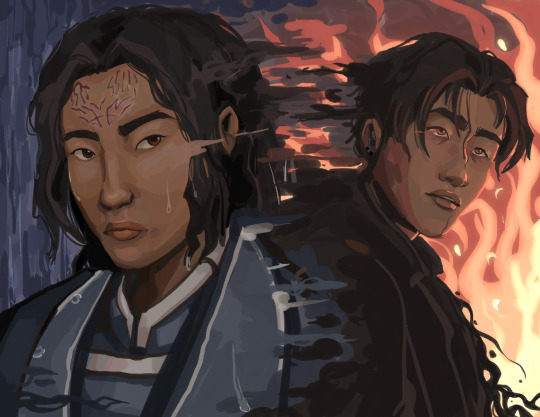


telling my kids this was jesus and judas
#PERSONALLY im hoping for at least an attempted redemption bec i think it would be interesting#but only right after kaladin kicks his ass BIIIGGGG time#i LOOOOVVE foils i love seeing horrible characters and actions explored im so ready to go#rhythm of war#kaladin stormblessed#moash#stormlight spoilers#stormlight archive
747 notes
·
View notes
Text
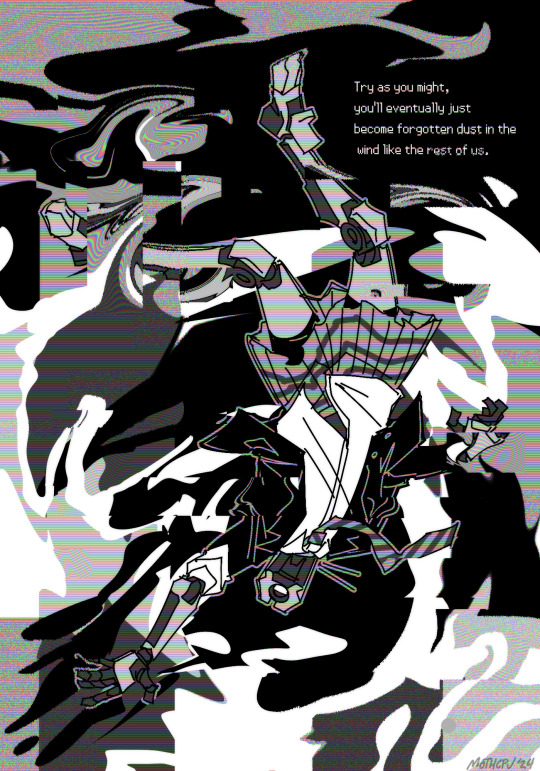
There's no point in trying if the end result will be the same anyway.
#ULTRAKILL#mirage#mirage ultrakill#happy 3 year anniversary of 2-S :) dect anniversary is coming up soon too on the 29th damn#visually inspired by the MV for halved halved halved by hundotte vs frums (from NOISZ STARLIVHT which happens to be a great rhythm game)#had to export this so many times while moving it back and forth from krita to gimp OTL
2K notes
·
View notes
Text

In the spirit of the Ithaca Saga release here's some OdyPen! I cried SO much at the line "There's a girl I have to see" and at Would you Fall in Love with Me Again so it was only fair I made then crying too. Anyways, it was amazing being part of the fandom during the realeases (although I only arrived this year) so I wanted to make something for it!
#epic the musical#the ithaca saga#penelope#odysseus#odypen#jorge rivera herrans#fanart#my art#artists on tumblr#digital art#There's not much to yap about this time. All the songs are AMAZING and although I do feel weird about having Hold Them Down on repeat IT'S#SO GOOD!! I have 0 knowledge about music but the rhythm/beat (?) and Ayron's voice just tickles my brain in the best way possible#So if you haven't heard Epic the Musical please do it'll be worth it
575 notes
·
View notes
Text
Irish-uwufication is so fucking weird anyway but like people act like Hozier - who writes primarily blues songs about politics, books and music he finds interesting, and having sex with hot women he picks up in bars - is just a nature man is so weird. Like you have Americans saying he is a bog man, he only writes acoustic songs about chaste love and nature. He lives in the woods and doesn’t interact with society at all. He is made of trees and fairies because that’s what Ireland is.
#saw a tiktok and got passionate#so many Irish poets get this treatment too it’s weird#hozier#andrew hozier byrne#Hozier writes about politics all the time#he has an entire song based on albums he likes#not to mention he talks all the time about how influenced he is by black blues singers and rhythm guitarists not white acoustic guys#zee rambles
7K notes
·
View notes
Text
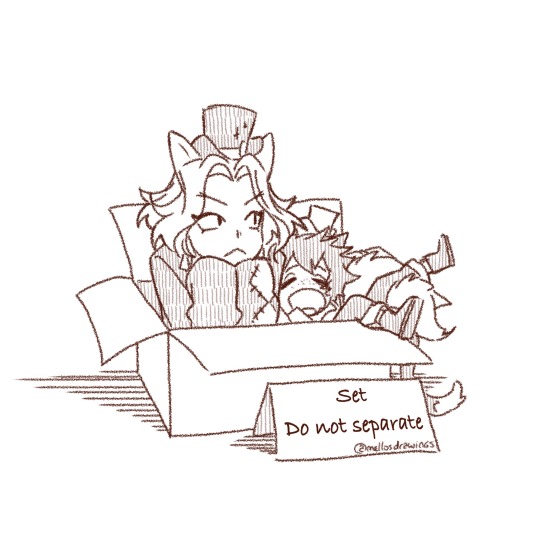
One of the rare things I managed to draw during my blank period.
#i'm still not done with the Playful Land doodles#with my rhythm they'll be done by the time the event reruns next year /jk#oh well#i've always been bad at posting things on time#cloudcalling and halloween were miracles really#mello's drawings#twisted wonderland#twst#fellow honest#ernesto foulworth#twst gidel#twst gino#my art#reblog
471 notes
·
View notes
Text



have a body, feel the groove
#dj crazy times#planet of the bass#gif#gifs#im so obsessed with this one part of the video where he is just goin wild in the background; i just HAD to make a shitty little gif of it#he is feeling the groove!!!!!#rhythm is the new style of dance!!!!!!!!
4K notes
·
View notes
Text
make your decision, i know it's a tough one

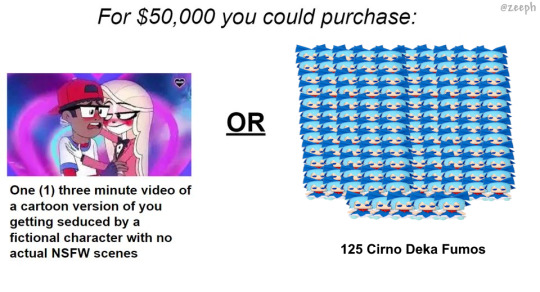
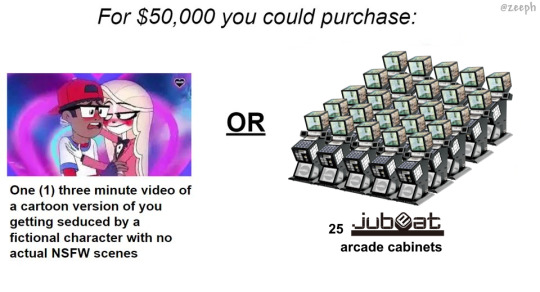
(i hope I did the math right on this)
#i fucked up the math on this the first time I posted it#specifically on the iidx one#i didn't make the template only edited it#beatmania iidx#beatmania#jubeat#bemani#meme#shitpost#cirno#fumo#fumo fumo#dekafumo#hazbin hotel#verbalase#iidx#rhythm game
3K notes
·
View notes
Text

if you've ever felt like you've fucked up really badly never forget: you've never fucked up so horribly awful on a gacha game that it announced both it's global version's opening and closing in literally the same tweet
#TRULY the rhythm game of all time#love live#love live!#school idol project#school idol festival#love live! school idol festival#sif#µ's#aqours#nijigasaki high school idol club#liella#sif2#sunrise
1K notes
·
View notes
Text









MINHO | 'Body Rhythm' ✦ Waterbomb 🔥💕 [Vid Cr x]
#SHINee#minho#choi minho#body rhythm#waterbomb#analook#i really have no more words for him 🔥💕#he had the time of his life#and left shawol casualties everywhere#the man the myth the legend#my.gifs
508 notes
·
View notes
Note
Do yoy like their silly little dance
the inside of my brain at any given moment:

#twisted wonderland#twisted wonderland spoilers#stage in playful land#stage in playfulland#gif warning#gifs that bop along to your music warning#gidel is SO little#look at him compared to everyone else!#three apples tall!#i could put him in my pocket and still have space to pack him a lunch#this rhythmic is so silly. i love when we get a cutesy upbeat rhythmic right before everything goes straight to shit.#fellow and gidel: (dance around all cutely and throw confetti)#fellow and gidel: anyway now it's time to sell you#just the most adorable little kidnappers 🩷#so glad they made an official gidel chibi because otherwise i would have tried to and it would not have ended well#i'm trying to do a meleanor right now and she is giving me enough trouble. she doesn't even have any STRIPES.#do you think the riggers got handed the designs for this event with all the stripes and swirlies and patches and patterns#and just had to go stare at a wall for an hour or two#'okay look people are going to see this on a small screen with a rhythm game going on in the foreground'#'nobody is going to take a high-res screen recording and then go through it frame-by-frame to scrutinize our rigging breakdowns'#'what kind of HUGE NERD do you think plays this stupid game'#(shifty eyes)
1K notes
·
View notes
Text
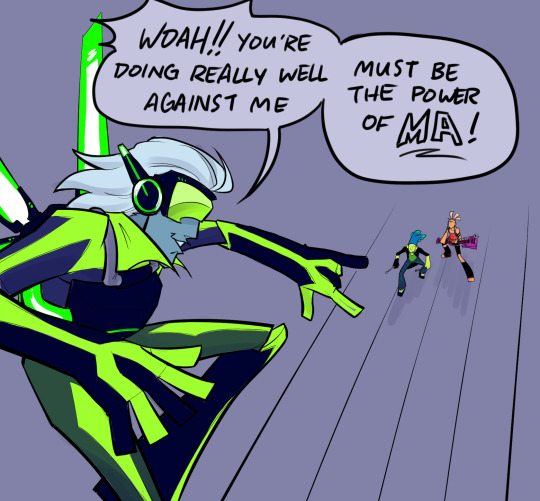
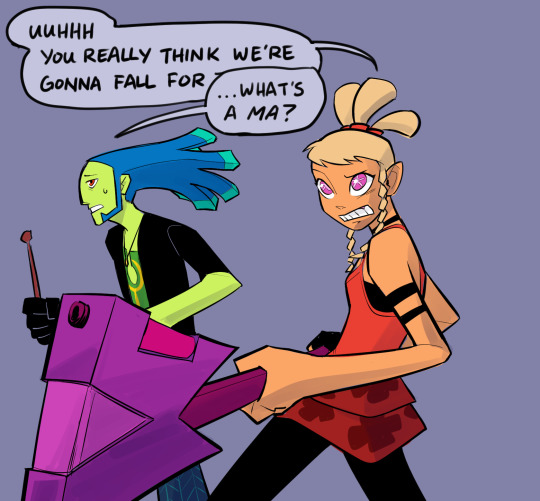
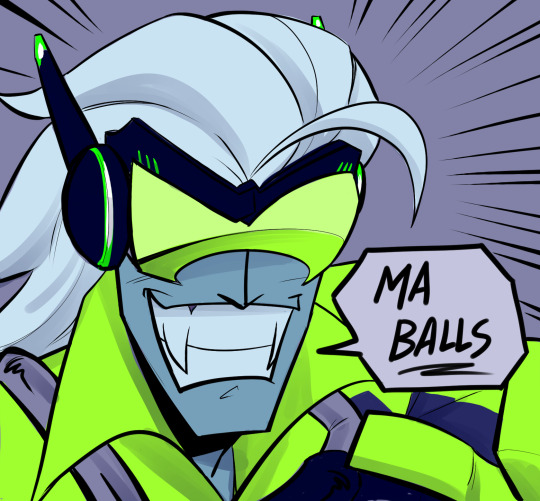
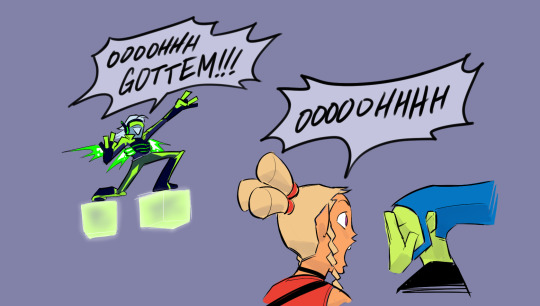
a years-old draft that i finally got around to polishing up, joke courtesy of a friend of mine, Bofa
#art#bread art#oc art#nsr#nsr fanart#nsr oc#no straight roads#nsr mayday#nsr zuke#KK#BOFA DEEZ NUTS OOOOOOOOHH#for real though many thanks to vulpes-intuos for this JDJSKKDKSK#this isnt during boss battle theyre just having a good time with a rhythm game
619 notes
·
View notes
Text
[During the Stray Kids pre-debut show] Minho: I didn’t understand why people care so much for their dumb friends until I got a dumb friend myself. Minho: *Picks Jisung up* Minho: I’ve only befriended Jisung for a day and a half, but if anything happened to him, I would kill everyone in this room and myself.
#Minho#Jisung#i think about minho holding jisungs hand when he rapped hellavator for the first time and jisung squeezed his hand to keep rhythm weekly#lee minho#han jisung#Stray Kids#Skz#Incorrect stray kids quotes#incorrect stray kids#incorrect skz quotes#incorrect skz#incorrect kpop quotes#incorrect kpop#kpop
808 notes
·
View notes
Text
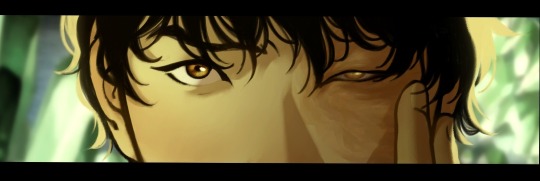
Almost
#zutara#atla#zuko#avatar the last airbender#katara#zutara fanart#Wip#First page of three is done!!!#Won't be sharing until I have the whole thing but I'm. So. Close!!!!!!!#It's been ages since I started this project omg#But it's worth it#Hopefully I'll get the chance to finish it tomorrow... Won't be making any promises tho#I've missed you guys and I can't wait to share this with you#Anyways I know it's ZK month (and all the content has been WONDERFUL so far) but I won't be participating. Sorry about that.#Working with prompts is such an amazing creative exercise but I know myself good enough to be certain that I'll never get past the first...#... prompt without coming up with seven different AUs and I can't deal with more of those right now lol#Like I've got this Blue Spirit! Katara and Painted Lady! Zuko AU on the works since last week or so. And more lore for the og BS/PL spirits#And also this S3 canon divergence AU... And another one... And another one...#And I need to work on them at my own rhythm otherwise I'll go nuts#So uh#Yeah#Love u all and I hope I'll get to share this one soon (if only to start on yet another comic. I've got ideas for two of them. Yay)#Dema out#(Sorry for the rambling I'm just anxious)#(Don't know why but I stopped caring a long time ago)
770 notes
·
View notes